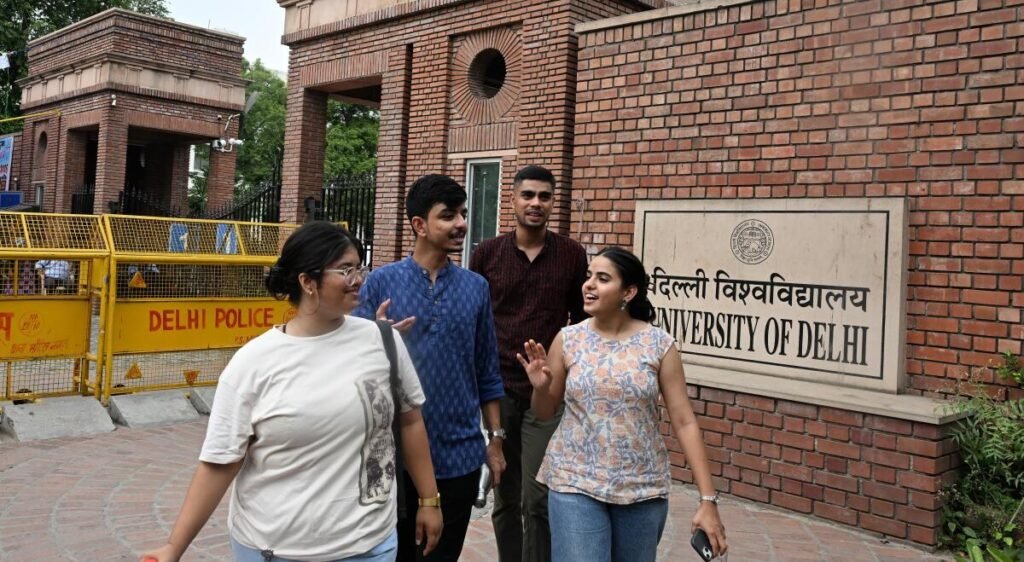
DU Teachers Petition President, Say Four-Year UG Programme Under NEP Is Destined to Fail Without Proper Support
The Delhi University Teachers’ Association (DUTA) has voiced serious concerns over the implementation of the Four-Year UG Programme (FYUP) under the NEP, National Education Policy 2020, calling it “a recipe for failure” due to gaps in planning, infrastructure, and funding. In a formal petition submitted to the President of India — who serves as the Visitor of the university — DUTA urged the government to reassess the rollout and address urgent concerns.
The petition, supported by nearly 2,000 DU faculty members, outlines how the current academic environment is ill-prepared to accommodate the demands of the four-year structure, which is slated to be rolled out starting August 1, 2025.
“No Infrastructure, No Manpower — But New Structure?”
At a press conference, DUTA President Prof A.K. Bhagi said the university lacks the essential resources to make the FYUP viable. “We don’t have enough classrooms, lab space, or teaching faculty. Yet, the student intake is increasing under this policy. Without the necessary manpower and infrastructure, the fourth year of the FYUP is simply not feasible,” he said.
He added that academic autonomy must not be sacrificed for financial support and warned that pushing through the policy without proper groundwork would put student futures at risk.
Opposition to Draft UGC Regulations
In their petition, DUTA also demanded the withdrawal of the Draft UGC Regulations 2025, particularly in light of the pending Pay Review Committee (PRC) report. Faculty members believe that rolling out new regulations without addressing long-standing service-related issues will further marginalise teachers.
DUTA Secretary Dr Anil Kumar stressed that these regulations must not be implemented in isolation and should be aligned with the recommendations of the 8th Pay Commission after wide consultation with academic stakeholders.
Overburdened Faculty and Diluting Standards
The association flagged multiple concerns currently affecting Delhi University, including:
- Overcrowded classrooms and insufficient lab infrastructure
- Delays in the academic calendar due to systemic inefficiencies
- Faculty being stretched too thin with increased workloads and fewer teaching hours
- Incompatibility of online platforms like SWAYAM and MOOCs with DU’s curriculum
DUTA also criticised the use of these platforms to earn academic credits, stating that it undermines in-person learning and student-teacher engagement — a key pillar of higher education.
DUTA Treasurer Dr Akanksha Khurana warned that implementing such sweeping policy changes without feedback mechanisms or resource planning could destabilise the very structure of public universities, defeating the NEP’s original goals of holistic and inclusive education.
Faculty Demands and Pending Issues
Among other demands, DUTA also called for:
- Restoration of MPhil and PhD increments
- Recognition of ad-hoc service for promotions
- Lifting arbitrary caps on senior professor posts
- A standard two-month timeline for processing promotions
- Special recruitment drives to fill existing faculty vacancies, especially those stuck under the “Not Found Suitable” clause
DUTA Vice President Dr Sudhanshu Kumar said there needs to be parity in service conditions for all academic roles and that vacancies must be filled without delay to maintain academic quality.
Teachers Not Opposed to Reforms — But Want Realistic Planning
Veteran academic Prof Aditya Narayan Misra clarified that the faculty is not against the four-year structure in principle. “But without adequate resources and faculty, it’s bound to collapse. They’ve cut teaching hours, increased student numbers, and reduced practical training. How can that improve educational quality?” he asked.
He also warned that if their concerns continue to be ignored, the teaching community may be forced to stage protests and demonstrations.
While DU Vice Chancellor Yogesh Singh has described the FYUP as a “game changer” that promotes research, entrepreneurship, and skill development, DUTA remains firm that the current infrastructure and faculty strength fall short of supporting such aspirations.
A Call for Academic Freedom and Collaboration
In conclusion, DUTA urged both the President and the Union Ministry of Education to ensure that any educational reform — including the NEP — must be guided by principles of academic freedom, teacher welfare, and genuine stakeholder consultation, instead of being imposed through top-down policymaking.
Also Read: CSSS Scholarship: CBSE Invites Applications for College Students
Also Read: NIIT University Leads Green Renaissance in Aravallis During Van Mahotsav 2025